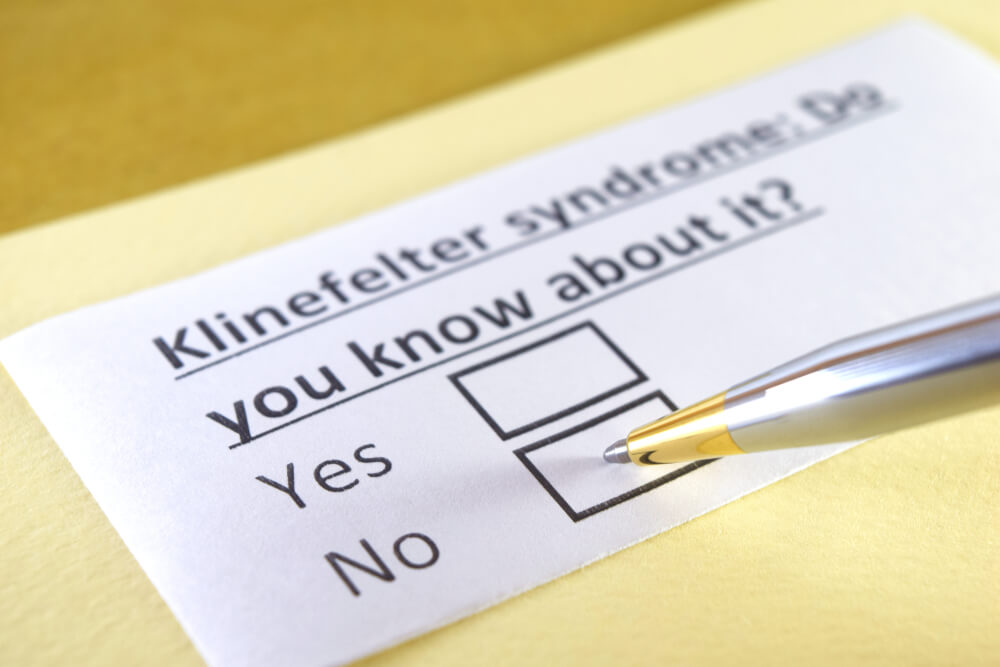As a parent, you want the best for your child. When you hear that they might be diagnosed with a pediatric genetic disorder that impacts the course of their life, it can be stressful and emotional. Getting the facts right is critical to ensure that you can make informed decisions. What should parents understand about Klinefelter syndrome or XXY chromosome disorder? What is the Klinefelter syndrome life expectancy for children diagnosed with it? Here’s what you need to know.
What Is Klinefelter Syndrome or XXY Syndrome?
Klinefelter syndrome is a pediatric genetic disorder that occurs in males who are born with an extra 23rd chromosome. In these cases, instead of an XY chromosome, the children will have an XXY chromosome. It happens randomly as reproductive cells form, and there is no genetic component of this XXY chromosome disorder. This means that there are no ways to prevent it. It affects approximately one in every 650 males, and it is one of the most common sex chromosome disorders.
The symptoms of Klinefelter syndrome sometimes never manifest, which means that men can lead happy and healthy lives before they ever realize that they have it. In other instances, boys might experience a range of social, behavioral, cognitive, and learning challenges that lead to an eventual diagnosis. Meeting with a doctor as soon as possible can reduce the likelihood of developing additional symptoms of XXY syndrome.
What Are the Symptoms of Klinefelter Syndrome?

The signs of this pediatric genetic disorder can vary, as some babies have immediate indicators of XXY syndrome while others grow into adults who never know they have it. Many times, the first moment that men realize they have Klinefelter syndrome is when they experience fertility issues.
If symptoms of Klinefelter syndrome are present, they can include:
- Abnormal breast growth or enlarged breasts
- Small testicles
- Learning disabilities
- Delayed or partial puberty that results in a higher-pitched voice, abnormal body fat distribution, or sparse body and facial hair
- Infertility
- Abnormal body proportions, such as hips that are as wide as the shoulders or a short torso with long legs
- Speech delays
- Weak muscles or poor muscle mass
- Slow motor development
- Low sperm count
- Social or behavioral challenges
- Cryptorchidism, or a condition where one or both of the testes are in the abdomen instead of the scrotum
The impacts of this 23rd chromosome disorder can depend on when the diagnosis is made, what treatment is given, how much testosterone your child’s body is producing, and if he has only XXY cells or a mixture of XXY and XY cells. Klinefelter syndrome life expectancy is very similar to the life expectancy of any adult, and in most cases, it only shortens the lifespan by up to two years. Treatment can improve that outlook even more.
When Should You Visit a Doctor or Pediatrician About XXY Syndrome?
If you have noticed symptoms of Klinefelter syndrome in your son or you’re an adult male who is concerned that you might have an extra 23rd chromosome, visiting the doctor is critical. Delays in childhood development and missed growth milestones are causes for concern, and there can be many issues that might lead to them other than XXY syndrome. A doctor can perform tests to determine if your child has a pediatric genetic disorder.
Many adult men first discover that they have XXY chromosome disorder when they experience infertility issues. Men with an XXY 23rd chromosome have low sperm count or sometimes no sperm at all. They also typically have a lower sex drive and small penis and testicles. The doctor can take urine and blood samples to observe hormone levels and perform a karyotype analysis to confirm the diagnosis.
Is There Treatment Available for XXY Syndrome?
Once you receive your diagnosis, you can work with your doctor to review the ways you can improve or eliminate the symptoms of Klinefelter syndrome. Depending on the problems your child is experiencing, your care team could include:
- a pediatrician
- an endocrinologist
- a physical therapist
- a speech therapist
- an infertility specialist
- a genetic counselor
- a psychologist
There is no way to reverse XXY syndrome, as the 23rd chromosome cannot be changed. However, there are treatments that can reduce the symptoms and improve Klinefelter syndrome life expectancy. Some of the treatments can include:
- Speech and physical therapy to address speech delays, language difficulties, or muscle weakness.
- Testosterone replacement therapy to assist with stimulating the physical changes that typically occur over the process of puberty.
- Educational assistance in school or at home to ensure learning challenges or speech delays don’t hold your child back.
- Fertility treatment for men who have a low sperm count.
- Breast removal for men who have excessive breast tissue or abnormal growth.
- Therapy to assist with the mental health impacts of XXY chromosome disorder throughout puberty, young adulthood, and adulthood.
A proper diagnosis can improve the outlook for your child and make sure that they have the support needed to thrive, regardless of the severity of their symptoms.
How Is Klinefelter Syndrome Life Expectancy Different?
Every parent wants the best for their child, and the good news is that Klinefelter syndrome life expectancy is very similar to the life expectancy for any adult. Early diagnosis and aggressive treatment with a skilled care team can limit any increases in risk. In general, having Klinefelter syndrome can shorten your lifespan by up to two years. Working with experts in pediatric genetic disorders is critical to ensure a positive outcome.
What Other Risks Are Associated With Klinefelter Syndrome?

While life expectancy is not majorly impacted, there are other conditions and diseases that Klinefelter syndrome can increase the risk of. If your child has a positive diagnosis, they may be at an elevated risk of:
- Osteoporosis
- Infertility
- Sexual dysfunction
- Anxiety
- ADHD
- Limited executive functioning skills
- Social, emotional, and behavioral challenges
- Depression
- Heart disease
- Varicose veins
- Blood vessel disorders or issues
- Breast cancer
- Lung disease
- Lupus and other autoimmune disorders
- Metabolic syndromes including diabetes and hypertension
- Autism
Your pediatrician can work with you to minimize risk and mitigate other factors that might increase the risk of the conditions and diseases listed above. There is new research being performed to discover more effective ways to reduce Klinefelter syndrome impacts like infertility and sexual dysfunction.
Are You Concerned That Your Child Has Klinefelter Syndrome? Call the Pediatric Endocrine and Metabolic Center of Florida Today
When you feel that something is wrong with your infant or child, it can be overwhelming. Many parents are unsure where to turn and how to get information, testing, and support. At the Pediatric Endocrine and Metabolic Center of Florida, we work with parents and families just like yours to find the correct diagnosis and provide you with the support you and your child need to thrive.
How can we help your child live their best life? If your child has already been diagnosed with Klinefelter syndrome, we can also be part of their care team. With quality care, thorough testing, and a dynamic plan to ease symptoms, your child can live a long, happy, and healthy life. To learn more, contact the Pediatric Endocrine and Metabolic Center of Florida today by calling (772) 834-7362 or using the button above to request an appointment.


